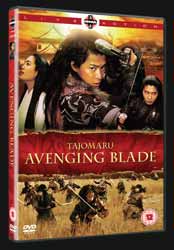|
Click here to return to the main site. DVD Review
As a young man Naomitsu Hatakeyama saves and befriends a child thief, allowing him to join his brother and his young love, Ako. Having no name of his own Naomitsu names him Sakuramaru, after the cherry blossom. When they grow to manhood the death of Ako’s father forces the brothers into a choice, for with Ako comes her father’s wealth and power. Betrayed, Naomitsu flees with Ako into the forest where they are attacked by the famous forest bandit Tajomaru. In the ensuing fight Ako begs Tajomaru to kill Naomitsu before running away. Enraged, Naomitsu kills Tajomaru, taking his name and his sword... Tajomaru: Avenging Blade (2009 - 2 hr, 06 min, 08 sec) is a period, samurai, movie very loosely based on Ryunosuke Akutagawa’s short stories Rashomon and In the Grove. The film was directed by Hiroyuki Nakano. Basing the film on the same stories which Akira Kuosawa used would seem to beg comparisons, though in this case its best not to. Rashamon was a classic, Tamomaru, is a fair but flawed film, certainly not in the same league. The success, or failure, of the film will rest very much on how you feel about the modernising aspects of the film, but then In a Grove also took a modernist approach to the search for identity, so adding elements like rapping bandits and a modern soundtrack will either strike you as an anathema or a brave experiment. In truth, the modernist elements are not so invasive as to destroy the film. The story follows Naomitsu as he turns his back on his family and inheritance for the love of Ako, only to, in turn, be betrayed. As Tajomaru, he leads his bandits, who quickly turn their activities to philanthropic pursuits, turning them into pseudo merry men. Word soon reaches him that his brother is dead and that he has been returned to the Shoguns favour. Returning home, he discovers that Sakuramaru has not only taken his place but has also married Ako. Although, it might seem strange that Sakuramaru would betray the man who saved him as a boy, the film strongly alludes to the idea that, as a child, Sakuramaru became, shall we say, a particular favourite of the Shogun. It is this experience which warps him. Power and prestige becomes Sakuramaru's only concern and as a favourite of the Shogun even Naomitsu’s reappearance does not guarantee justice. The cast, Shun Oguri (Naomitsu Hatakeyama), Yuki Shibamoto (Ako), Kei Tanaka (Sakuramaru) and Hiroyuki Ikeuchi (Nobutsuna Hatakeyama) give fine performances, although a lot of the supporting cast over emote to the point of parody. The start to the film, with the cherry blossom orchards, is particularly beautiful and the cinematography, for the most part, does the film justice. The film is presented with a 1.85:1 anamorphic transfer and a print which is clear and bright. Audio is DD 5.1 and DD 2.0 Japanese, with optional English subtitles. Bonus material consists of the Domestic Trailer (25 sec), the Original Japanese Trailer (2 min, 02 sec). More substantially, we have The Making of Tajomaru (17 min, 07 sec); it’s a light piece consisting of behind the scenes pieces, shots from the film with a talk over. So, it’s a slightly discordant film, I’m not sure that personally I felt that the modern elements, especially the rapping, played as well as they must have looked on paper, but it’s an interesting take on an old tale. 6 Charles Packer |
|---|

